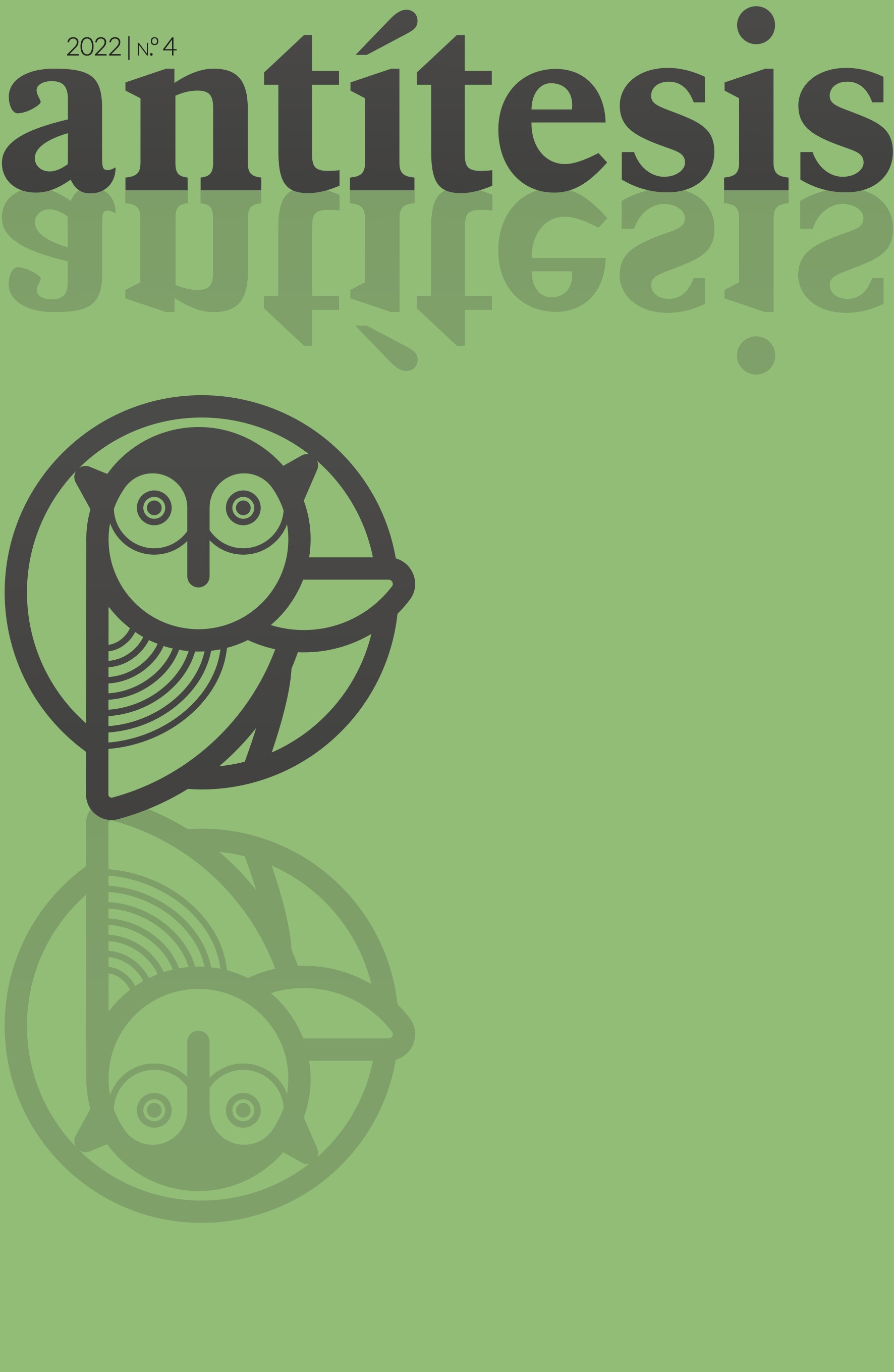El concepto puro del reconocer y su aparecer para la autoconciencia en la Fenomenología del espíritu
Palabras clave:
reconocimiento, concepto puro, aparecer, momentos, autoconcienciaDerechos de autor 2022 Milton Abellón

Esta obra está bajo una licencia internacional Creative Commons Atribución 4.0.
Resumen
Este trabajo analiza los dos momentos de la exposición hegeliana del reconocimiento (Anerkennung) que se desarrollan al final de la parte introductoria y en la sección A del capítulo IV de la Fenomenología del espíritu (1807), (i) el concepto puro del reconocer y (ii) el aparecer de dicho concepto para la autoconciencia, con el fin de esclarecer el sentido específico de la noción de reconocimiento en el marco problemático de dicho capítulo. Nuestra primera tesis es que el primer momento (i) establece los momentos constitutivos del movimiento del reconocer y, con ello, de la mediación intersubjetiva de la autoconciencia, sólo desde la referencia (Beziehung) práctica y recíproca entre las dos (auto)conciencias en las que la autoconciencia se duplica. Nuestra segunda tesis es que el segundo momento (ii), en particular la dominación y la servidumbre, muestra que el reconocimiento implica una triple referencia de la autoconciencia que persiste como conciencia [sc. (auto)conciencia], pues desarrolla la doble referencia práctica entre las dos (auto)conciencias y la referencia práctica e intersubjetiva de la autoconciencia duplicada con el algo vivo o la «cosa natural» que era objeto de la apetencia. Nuestra tercera tesis es que, aunque el reconocimiento recíproco no se realice en la sección A, su exposición exhibe que consiste en el resultado del movimiento de la referencia práctica e intersubjetiva de la (auto)conciencia, constituyendo el momento en el que la autoconciencia superaría su contraposición como conciencia y alcanzaría la unidad mediada consigo misma en la unidad mediada con el ser otro.
Descargas
Citas
ARMSTRONG KELLY, G., «Notes on Hegel´s “Lordship and Bondage”», en O´NEIL, J., Hegel´s Dialectic of Desire and Recognition: Texts and Commentary, Albany, State University of New York Press, 1996, pp. 253-272.
BEISER, F., Hegel, New York-London, Routledge, 2005.
BERTRAM, G., Hegels „Phänomenologie des Geistes“. Ein systematischer Kommentar, Ed. Ebook, Stuttgart, Reclam, 2017.
BONSIEPEN, W., «Einleitung», en HEGEL, G. W. F., Phänomenlogie des Geistes, Frankfurt am Main, Felix Meiner, 1988, pp. IX-LXIV.
DE ZAN, J., La Filosofía práctica de Hegel, Río Cuarto, Ediciones del ICALA, 2003.
FINDLAY, J., Hegel. A Reexamination. New York, Macmillan, 1958.
FÖRSTER, E., «Hegels „Entdeckungsreisen“, Entstehung und Aufbau der Phänomenologie des Geistes», en VIEWEG, K. y WELSCH, W., Hegels Phänomenologie des Geistes. Ein kooperativer Kommentar zu einem Schlüsselwerk der Moderne, Frankfurt, Suhrkamp, 2008, pp. 37-57.
GADAMER, H.-G., «Hegels Dialektik des Selbstbewußtsein», en Hegels Dialektik: Sechs hermeneutische Studien, Tübingen, Mohr, 1980, pp. 47-64.
HEGEL, G. W. F., Phänomenologie des Geistes, en Gesammelte Werke, Band 9, Hg. v. Bonsiepen, W. und Heede, R., Hamburg, Felix Meiner [1807] 1980.
HOFFMANN, T., Hegel. Una propedéutica, Trad. M. Mueriera y K. Wrehde, Buenos Aires, Biblos, [2004] 2014.
HONNETH, A., «Von der Begierde zur Anerkennung; Hegels Begründung von Selbstbewußtsein», en Das Ich im Wir. Studien zur Anerkennungstheorie, Berlin, Suhrkamp, 2010, pp. 15-32.
HOULGATE, S., Hegel´s Phenomenology of Spirit. A Reader´s Guide, London, Bloomsbury, 2013.
JENKINS, S., «Hegel’s Concept of Desire», Journal of the History of Philosophy, 47, 2009, pp. 109–130.
KALKAVAGE, P., The Logic of Desire. An Introduction to Hegel´s Phenomenology of Spirit, Philadelphia, Paul Dry Books, 2007.
KOJÈVE, A., Introduction à la lecture de Hegel, París, Gallimard, 1947.
NEUHOUSER, F., «Deducing Desire and Recognition in the Phenomenology of Spirit», Journal of the History of Philosophy, 24-2, 1986, pp. 243-262.
------, «Desire, Recognition, and the Relation between Bondsman and Lord», en WESTPHAL, K., The Blackwell Guide to Hegel’s Phenomenology, West Sussex, Wiley Blackwell, 2009, pp.37-54.
PIPPIN, R., Hegel on Self-consciousness. Desire and Death in the Phenomenology of Spirit, Princeton-Oxford, Princeton University Press, 2011.
PÖGGELER, O., Hegels Idee einer Phänomenologie des Geistes, Frakfurt am Main, Verlag Karl Alber GmbH, 1973.
RENDÓN, C., «La dialéctica del deseo en la Fenomenología del Espíritu de Hegel», Tópicos, 24, 2012, pp. 1-16.
SHKLAR, J., «Self-sufficient Man: Dominion and Bondage», en O´NEIL, J., Hegel´s Dialectic of Desire and Recognition: Texts and Commentary, Albany, State University of New York Press, 1996, pp. 289-304.
SIEP, L., «Der Kampf um Anerkennung. Zur Hegels Auseinandersetzung mit Hobbes in den Jenaer Schriften», Hegel-Studien, 9, 1974, pp. 155-207.
---------, Anerkennung als Prinzip der praktischen Philosophie. Untersuchungen zu Hegels Jenaer Philosophie des Geistes, Friburgo-Munich, Verlag Karl Alber, 1979.
---------, Der Weg der Phänomenologie des Geistes. Ein einführender Kommentar zu Hegels „Differenzschrift“ und „Phänomenologie des Geistes“, Frankfurt, Suhrkamp, 2000.
---------, «Die Bewegung des Anerkennes in der Phänomenologie des Geistes», en KÖHLER, D. y PÖGGELER, O., Phänomenologie des Geistes. Klassiker auslegen, 16, 2, Berlin, Akademie Verlag, 2006, pp. 109-130.
--------, Anerkennung in Hegels Phänomenologie und der heutigen praktischen Philosophie, en SCHMIDT AM BUSCH, H.-C. y ZURN, C., Anerkennung, Berlin, Akademie Verlag, 2009, pp. 107-124.
QUANTE, M., «The Pure Notion of Recognition”: Reflections on the Grammar of the Relation of Recognition in Hegel’s Phenomenology of Spirit», en SCHMIDT AM BUSCH, H.-C. y ZURN, C., The Philosophy of Recognition, New York, Lexington Books - Rowman & Littlefield Publishers Inc., 2010, pp. 89-106.
REDDING, P., «The Independence and Dependence of Self-Consciousness: The Dialectic of Lord and Bondsman in Hegel’s Phenomenology of Spirit», en BEISER, F., The Cambridge Companion to Hegel and Nineteenth-century Philosophy, Cambridge, Cambridge University Press, 2008, pp. 91-110.
SHKLAR, J., «Self-sufficient Man: Dominion and Bondage», en O´NEIL, J., Hegel´s Dialectic of Desire and Recognition: Texts and Commentary, Albany, State University of New York Press, 1996, pp. 289-304.
STERN, R., The Routledge Guidebook to Hegel’s Phenomenology of Spirit. London – New York, Routledge, 2013.
WILDT, A., Autonomie und Anerkennung. Hegels Moralitätskritik im Lichte seiner Fichte-Rezeption. Stuttgart, Klett-Cotta, 1982.
WILLIAMS, R., Hegel´s Ethic of Recognition, Berkeley, University of California Press, 1997.
______ «The Concept of Recognition in Hegel´s Phenomenology of Spirit», en DENKER, A. y VATER, M., Hegel´s Phenomenology of Spirit. New Critical Essays, New York, Humanity Books, 2003, pp. 59-92.
